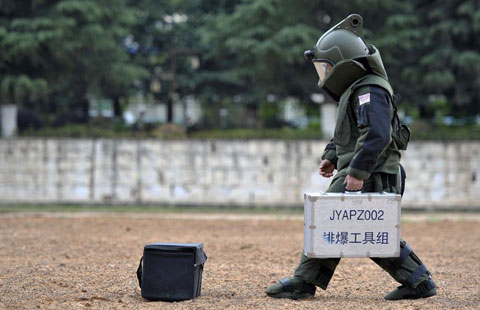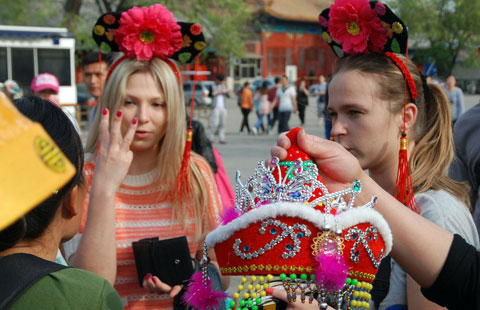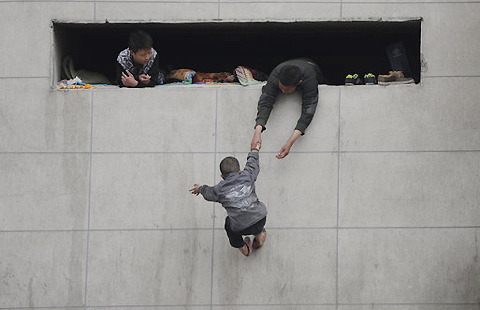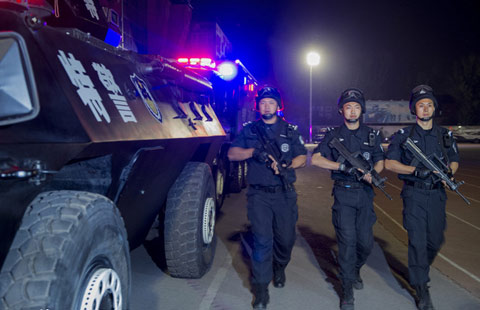The high life that borders on danger
By Hu Yongqi and Li Yingqing in Nujiang ( China Daily ) Updated: 2012-12-04 08:45:41Long-distance love
Huang had dreamed of becoming a soldier since childhood. So, when he graduated from Yunnan University of Nationalities in 2001, he enlisted in the Yunnan Provincial Frontier Defense Corp.
After six months' training, Huang was allocated to the police station in Luobenzhuo, Lushui county in Nujiang Lisu autonomous prefecture. The tiny settlement only had two stores and one restaurant, but even those meager amenities were better than those in Dulongjiang when he arrived in September 2003. At that time, Dulongjiang had no restaurant and no cellphone coverage.
![Huang Jianfeng, the political instructor at Dulongjiang Frontier Police Station, crosses the bridge he and his soldiers built at Pukawang village in Gongshan county, Yunnan province. [Photo by Wang Jing / China Daily] The high life that borders on danger](../../attachement/jpg/site1/20121204/0023ae9885da1227859427.jpg) |
|
Huang Jianfeng, the political instructor at Dulongjiang Frontier Police Station, crosses the bridge he and his soldiers built at Pukawang village in Gongshan county, Yunnan province. [Photo by Wang Jing / China Daily] |
After a celebratory dinner on Chinese New Year's eve, Huang and his fellow soldiers eagerly lined up at the town's only landline to phone home and greet their families.
"We called our parents through the operator in Kunming (Yunnan's capital). Each of us was allowed to speak for just three minutes because others were waiting," he said. He recalled his dismay at hearing his parents crying on the other end of the line and knowing there was nothing he could do to ease their tears.
"Sometimes you have to choose duty and sacrifice time with your parents," said the veteran of 13 years.
Before 2004, letters provided the only method of communication with the outside world. The soldiers used the radio network to dictate messages to colleagues, who would then faithfully transcribe the words and then post the letters. Even then, one of Huang's letters took two years to reach its destination because the mail service was suspended during the winter months.
The lack of interaction with the outside world leaves the soldiers isolated. Huang was unable to talk to his girlfriend in either 2003 or 2004. When he completed his tour of duty in 2005 and returned to Kunming, he discovered she had married another man. The same thing happened to at least eight of the soldiers serving in the region.
In October, Huang had an argument with his wife who lives in Liuku, the capital of the prefecture. When he left home in May to take up his duties in Dulongjiang, Huang promised to celebrate his son's 5th birthday by going home. However, pressure of work meant he was unable to keep his promise and his wife had threatened divorce. For the following five days, Huang made peace by sending affectionate texts, calling his wife "sweetheart". It was the first time he'd ever called her that, he said.
This is Huang's second stint working at the remote station, located deep in a valley that nestles below the 4,000 meter-high mountains. Unlike other frontier stations in Nujiang, Dulongjiang has only one means of exit or entry and that is buried in 2-meter-deep snowdrifts from November to June. During the winter, no one enters the township and no one leaves.
"It's often very lonely in this sparsely populated place, so we are always happy to see the local people," said Chen Jiawen.
Because of the workload and isolation, few of the 22 soldiers in Dulongjiang have managed to take their 40-day annual leave.
"Things have improved during the past few years and I can talk with my son on the mobile phone," Huang said. "I know my wife was completely right, but still, I have duties to fulfill. I will ask for leave next month so we can be reunited."
Zhang Hui, 27, has married a woman in Liuku. However, three years later, he still hasn't officially completed his wedding because he hasn't been able to get away and complete the formalities in his hometown in Sichuan province.
"Technically I have had just half a wedding, according to Sichuan tradition. That's not acceptable to my grandparents, but I've been too busy here and couldn't take my wife back home to meet them," he said.
![Gao Yaowang, a soldier from Dulongjiang Frontier Police Station, positions a villager before taking a photograph for her ID card. [Photo by Xie Yong / for China Daily] The high life that borders on danger](../../attachement/jpg/site1/20121204/0023ae9885da1227862f28.jpg) |
|
Gao Yaowang, a soldier from Dulongjiang Frontier Police Station, positions a villager before taking a photograph for her ID card. [Photo by Xie Yong / for China Daily] |
|
|
|
|
|
|
|
|


















 Op Rana
Op Rana Berlin Fang
Berlin Fang Zhu Yuan
Zhu Yuan Huang Xiangyang
Huang Xiangyang Chen Weihua
Chen Weihua Liu Shinan
Liu Shinan